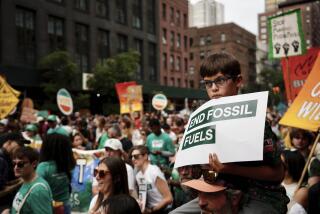In Pursuit of âThe Prizeâ: The Worldâs Epic Quest for Oil : Energy: In his new book, Daniel Yergin interweaves the business, politics and global intrigues of petroleum exploitation.
In 1979, Harvard Business School professor Daniel Yergin published âEnergy Future,â an optimistic analysis of the countryâs potential to shake its oil habit.
The timing was perfect: The decadeâs second oil crisis had sent gasoline prices soaring once again and wreaked panic at Americaâs pumps. Energy independence was the nationâs catch phrase.
âOur theme was that we shouldnât be dependent on foreign oil,â says Yergin of the pioneering book, which he co-wrote with fellow professor Robert Stobaugh. âIt was very optimistic.â
âEnergy Futureâ became a pivotal bestseller, startling the business community with its new concepts of fuel conservation and inspiring environmentalists with its emphasis on the potential of alternative energy sources.
âIt gave us credibility and hope,â says environmental activist Richard Munson, then director of the now-defunct Solar Lobby, one of the eraâs flock of emerging alternative energy groups. âComing out of the Harvard Business School, it was quite influential.â
Now Yergin, a recognized expert on both oil and global politics, has another bestseller, âThe Prize: The Epic Quest for Oil, Money & Power.â
The book, which has been snapped up for a nonfiction TV miniseries, has received glowing reviews as a compelling history of the oil industry that clarifies the contemporary world situation. It interweaves the business, politics and global intrigues of petroleum exploitation with such a scope of historical detail that it âdeserves to become the standard text on the history of oil,â the New York Times writes.
But for the true-believer environmentalist, seeking a reinforced gospel of energy independence, âThe Prizeâ holds little comfort. After spending almost a decade researching the role of oil in our lives--from the 1860s when John D. Rockefellerâs Standard Oil first marketed it as kerosene providing a ânew light,â to the Gulf crisis--Yergin has revised his blueprint.
We arenât shaking our U.S. dependency on oil, he writes. Rather, we have increased it, reaching a daily appetite of one-third of all oil used in the world. He has even assigned the phenomenon an anthropological classification: We have become Hydrocarbon Man--enjoying the fruits of the oil-based civilization we have created, and setting a model for emerging nations to imitate wherever they can.
âIt is oil that makes possible where we live, how we live, how we commute to work, how we travel,â Yergin writes. âOil provides the plastics and chemicals that are the bricks and mortar of contemporary civilization, a civilization that would collapse if the worldâs oil wells suddenly went dry.â
And the overriding symbol of our ease and mobility is the âsecular temple of modern civilization,â the gasoline station. âThe 500 gallons of gasoline that each motorist uses each year is the basis of his or her daily life,â he writes. âWeâre wedded to the car.â
These images donât brighten lives of alternative-energy advocates. Yergin acknowledges that events of the 1980s have redirected his earlier thinking. âIâve lost some of that blush of enthusiasm and optimism,â he says over breakfast during a quick business trip to Los Angeles. âLooking back on it, I would say in âEnergy Futureâ we were too optimistic. Interest in alternatives such as solar energy just hasnât flown.â
He ticks off a sequence:
* âPresident Nixon in 1973 called for Project Independence so we would never be reliant on foreign oil again. His advisers told him it was impractical.
* âPresident Carter in 1979 promoted synthetic fuels to liberate us from foreign energy. Again, it was impractical.
* âOur main energy policy since 1986 has been to import more oil. People just take it for granted--this whole mobile oil-based civilization we have created is just so massive. I get on the freeways and think itâs just amazing. I came to the conclusion that the age of oil is going to last a lot longer than people think, because there is no ready alternative.â
History shows that we did not, or could not, heed the warnings from the two oil shocks of the 1970s, he says. Instead of weaning ourselves from oil addiction, we have increased our appetite until it is gargantuan, a relationship confirmed âwhen the 1990s began with a struggle over foreign oil--the Persian Gulf on which the world was again becoming heavily dependent.â
Yergin, 44, enjoys his own hydrocarbon routine, living in the Washington suburbs with his wife Angela Stent (a professor of Soviet history at Georgetown University) and two children. He commutes between Washington and Boston, where he founded Cambridge Energy Research Associates in 1982.
His entrance to the petroleum world was oblique. He is a writer who learned narrative style from his journalist father, Irving Yergin, who died in 1986. His mother, Naomi Yergin, is a painter and sculptor. Dan Yergin was student body president at Beverly Hills High, holds a B.A. in English literature from Yale and was a Marshall Scholar in international relations at Cambridge, where he earned a Ph.D.
He was an established magazine journalist and newspaper opinion-page contributor before writing his first book, âShattered Peace,â about the origins of the Cold War. It sparked his interest in the combination of energy and political power. âEnergy Futureâ opened the world of energy and politics, and Yergin formed a consulting company. The firm now has offices in Paris, Oslo, San Francisco, Washington and Cambridge, Mass.
âI decided in the early â80s that what made sense for me to do was combine my interest in international politics and my identity as a storyteller with this particular subject (energy),â he says.
Thatâs when he began âThe Prize,â a mammoth historical account of how oil has shaped the modern world, the fate of nations and individual lives.
âOne reason the book took so long to write,â Yergin says, âis that it was a constant process of discovery, and along the way I fell in love with a lot of the characters.â The bookâs publication was a drama in itself: Yergin had missed two deadlines at Simon & Schuster and acknowledges that âthere was a danger that I would work on it forever.
âBut I had read so many books that were overtaken by events that I sort of had my antenna out about the next problem areas and last March I started to get signals: It became clear that Saddam Hussein was moving into this role to dominate the Gulf.â
He did some final revising, finished the epilogue and was in London reading proofs when Iraq invaded Kuwait, validating his instincts.
Published just before Christmas, âThe Prizeâ immediately âstarted flying out of the storesâ it now has sold 200,000 copies and is in its ninth printing. A Japanese-language edition comes out in May, with French, Italian and German editions due next autumn.
Simon & Schuster âcrashed it through production . . . in about three months,â says Yerginâs editor, Fred Hills. Ordinarily, he says, production for a book of this enormity--877 pages, including almost 100 photos, 65 pages of footnotes and a 25-page bibliography--would take a year. âWe felt the timing of the book was crucial for its place in history.â
The extra effort paid off. âThe book coincided with peopleâs need to know,â Yergin says. âHere was this crisis and there was no framework for it.â
Critics agree that Yergin has not only provided a framework, but a readable one.
âIâm right up there on the bestseller list with Millie the White House Dog and âIron Johnâ and âThe Inner Child,â chuckles the author. âI think people are surprised that a history of the oil industry can be a damned good book to read.â
Hollywood producer Jonathan Taplin, whose Trans Pacific Films has acquired television rights to âThe Prize,â thinks it will be equally compelling as a nonfiction miniseries: âItâs a way of looking at the last 140 years of world history through a prism that can help you understand the world and how the economics of the oil business is such a powerful force. We talked about why his own optimism has been tempered--how solar couldnât compete with $15 barrel oil.â
Taplin hopes to start production in mid-May on a series he thinks will enlarge understanding of crucial environmental trade-offs.
âWhat âThe Prizeâ says, is that itâs not enough to have good science or righteous belief in the environment,â he says. âYou have to understand how power and economics affect policy. You may have perfected a battery for an electric car, but if you donât figure out how Wall Street works with Washington youâll be sitting there with that battery until the year 2010.â
Yergin, who worried about sounding sexist when he coined the phrase Hydrocarbon Man-- âIt didnât work as person, â--maintains a wait-and-see attitude about the hydrocarbon future:
âIn a world approaching 6 billion people by the end of the decade, ultimately there will be an end to our hydrocarbon society because we are going to run out of it, in some fashion,â he says. âBut ironically, in the last six years our (knowledge of) reserves has increased by 40%--most of it in the Persian Gulf.â
But even as the Hydrocarbon Society continues to operate on oil, he foresees the growing environmental movement as the paramount challenge. âFor most of its history the oil business has been under attack,â he says, âbecause of scandals like Teapot Dome or suspicions of market manipulation.â
But today the assault comes from a different direction and the consequences of hydrocarbon combustion--smog and air pollution, acid rain, global warming and ozone depletion--threaten the very âfate of the planet itself,â he writes. âThough there is a widespread sentiment that environmental improvement is essentially âfree,â merely a matter of regulation, this is not likely to be the case. There will be a significant, if not easily calculable, price tag.â
This environment-versus-economy tension will have a much greater bearing on the future than finite supplies of oil, Yergin maintains. He foresees a decade of bitter debates about offshore drilling, domestic refining, power-plant location and automobile fuel efficiency.
The nation suffers from a basic contradiction, he says: âPeople donât want to substantially give up aspects of their lifestyle they value, such as mobility, autonomy, comfort, even though polls show they hold increasing environmental values.â
There are public policy conflicts, too, he adds. âAdjusting for inflation, gas is cheaper now than any time since the Second World War, which means there is not much incentive to people to conserve. People donât like to talk about a gasoline tax, but a modest increase could do a lot in conservation and provide funds for alternative research.â
And he suggests that energy research and development policies must be consistent enough that âpeople wonât feel they will be shipwrecked by twists and turns of the political tides.â
On the whole, Yergin says heâs still optimistic: âI think weâre moving into a recycling society. My son is getting a different education in science than I did--heâs much more ambivalent about technology. He comes home worried about the rain forest and polluted rivers and plastic bags at the supermarket.â
No magic wand will transform the system we have created, but he does see values slowly changing:
âItâs possible that Hydrocarbon Man will be replaced by Environmental Person.â
More to Read
Sign up for our Book Club newsletter
Get the latest news, events and more from the Los Angeles Times Book Club, and help us get L.A. reading and talking.
You may occasionally receive promotional content from the Los Angeles Times.







